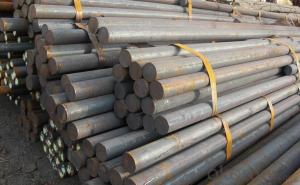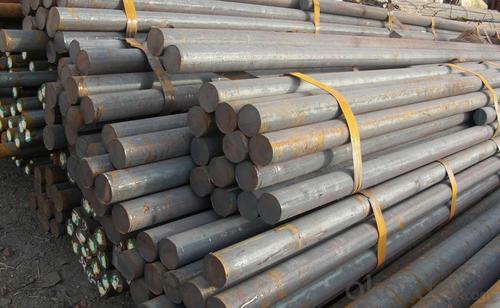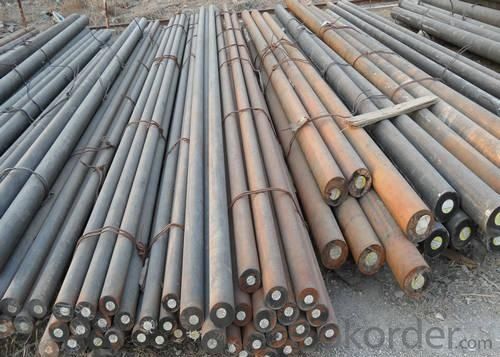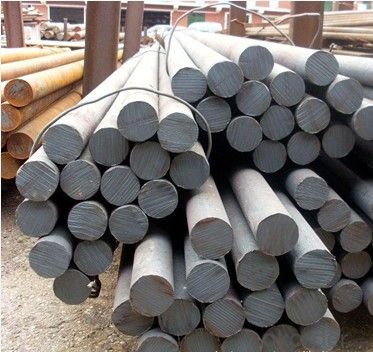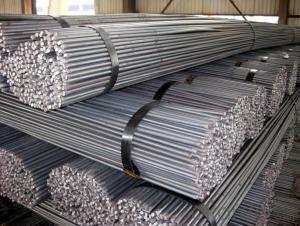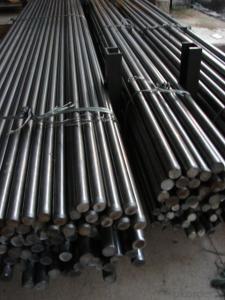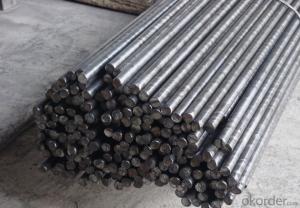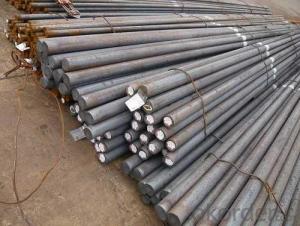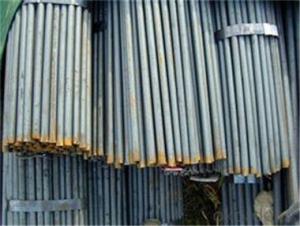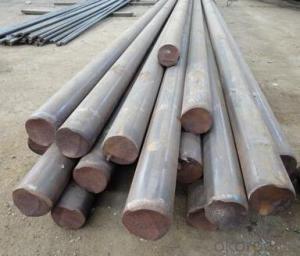GB 45#/SAE 1045 Steel Round Bar 16mm-18mm
- Loading Port:
- China main port
- Payment Terms:
- TT or LC
- Min Order Qty:
- 50 m.t
- Supply Capability:
- 10000 m.t/month
OKorder Service Pledge
OKorder Financial Service
You Might Also Like
GB 45#/SAE 1045 Steel Round Bar 16mm-18mm
Description:
-Specification: 16mm-18mm
-Length: 6m、12m
-Standard: GB/SAE/Japanese Standard
-Material: GB 45#/SAE1045/S45C
Chemical Composition of GB 45#/SAE 1045 Steel Round Bar 16mm-18mm:
| C | Si | Mn | P | S | Ni | Cr | Cu |
| 0.42-0.50 | 0.17-0.37 | 0.50-0.80 | ≤0.035 | ≤0.035 | ≤0.30 | ≤0.25 | ≤0.25 |
Packaging & Delivery of GB 45#/SAE 1045 Steel Round Bar 16mm-18mm:
Packaging Detail: All goods are packed in bundle with steel strips and shipped by break bulk vessel or container (depend on target market and different ports)
Delivery Detail: 45 days
MOQ: 50 tons per specification; we can negotiate the quantity if the specification is normal or we have stock of one specification.
Weight: The price invoicing on theoretical weight basis or actual weight basis depends on customer’s request.
Shipment: The shipment of bulk break or container is depends on customer’s request and the situation of the port of destination.
Documents given: Full set of original clean on board bill of lading; Original signed commercial invoice; Original packing list; Policy of insurance; Certificate of origin and what the target market needs.
Payment:
-Invoicing on theoretical weight or actual weight a s customer’s request.
-FOB, CFR or CIF.
-Regular terms of payment:
1, 30% payment in advance, the remaining balance (70% payment) against the copy of B/L.
2, 30% payment in advance, the remaining balance (70% L/C) against the copy of B/L.
3, Negotiable.
Images of GB 45#/SAE 1045 Steel Round Bar 16mm-18mm:
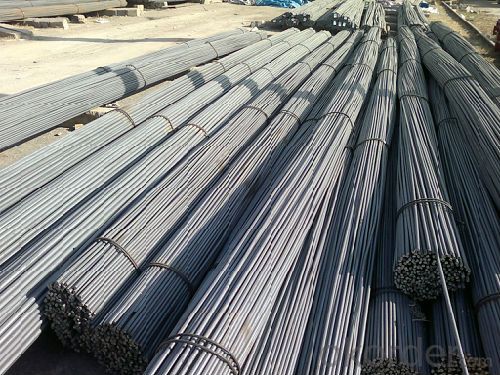
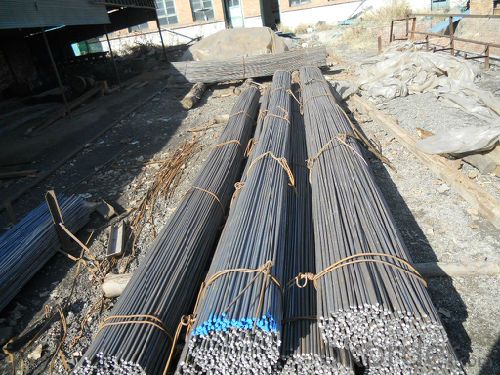
*If you would like to get our price, please inform us the size, standard/material and quantity. Thank you very much for your attention.
- Q: Can steel round bars be used in the manufacturing of cylinders?
- Yes, steel round bars can be used in the manufacturing of cylinders. Steel round bars are commonly used in various industries, including automotive, aerospace, and manufacturing, due to their high strength and durability. In the case of manufacturing cylinders, steel round bars can be a suitable material choice for constructing the cylindrical body of the cylinder. The steel round bars can be machined, forged, or rolled into the desired shape and then welded or fastened together to form the cylindrical structure. The use of steel round bars ensures a strong and sturdy construction, which is essential for the safe and efficient functioning of cylinders in various applications.
- Q: How do steel round bars perform under static or stationary loads?
- Steel round bars are known for their exceptional performance under static or stationary loads. Due to their high strength and durability, steel round bars have the ability to withstand heavy weights or forces without undergoing significant deformation or failure. When subjected to static loads, these bars distribute the applied force evenly throughout their structure, ensuring stability and structural integrity. One of the key advantages of steel round bars is their resistance to bending or sagging under static loads. Their inherent stiffness allows them to maintain their shape and prevent any significant deflection, making them ideal for applications where load-bearing capacity is crucial. Moreover, steel round bars possess a high yield strength, which means they can withstand large amounts of stress before permanent deformation occurs. Furthermore, steel round bars exhibit minimal creep under static loads, meaning they maintain their shape and dimensions over time, even when subjected to sustained pressure. This quality is especially important in structures or equipment that are expected to support constant loads for extended periods. Another factor that contributes to the excellent performance of steel round bars under static loads is their resistance to corrosion. Steel is inherently resistant to rust and oxidation, making it suitable for applications in various environments, including those with high humidity or exposure to moisture. In summary, steel round bars are highly reliable and efficient when it comes to handling static or stationary loads. They offer exceptional strength, resistance to deformation, and durability, making them a preferred choice in a wide range of industries, including construction, manufacturing, and infrastructure development.
- Q: How to distinguish between cold plating and hot rolled round steel?
- Cold galvanized profiles: cold galvanized is electroplating, is absorbed by the charge, the charge is concentrated in the edge, angle and other cutting-edge, so the inner surface and recess will not be plated phenomenon. The surface of the steel is relatively smooth and bright.Hot dip galvanized bar: hot dip galvanizing is to remove oil, pickling, dipping and drying into the molten zinc bath for a certain period of time. The appearance was galvanized slightly rough, silvery white appearance, easy to produce and process water a few drops of tumor, especially in the one end of the workpiece is more obvious.Galvanized quality certificate must be provided for hot-dip galvanized sections.
- Q: Can steel round bars be used for making steering linkages?
- Yes, steel round bars can be used for making steering linkages. Steel round bars are commonly used in various applications, including automotive and mechanical engineering, due to their high strength, durability, and resistance to wear and tear. Steering linkages are critical components in a vehicle's steering system, responsible for transmitting steering input from the steering wheel to the wheels. The use of steel round bars provides the necessary strength and rigidity required to ensure efficient and reliable steering performance. However, it is important to consider other factors such as the specific design requirements, weight considerations, and the desired level of flexibility or torsional properties when selecting the appropriate type and size of steel round bar for steering linkages.
- Q: What are the different surface hardness options for steel round bars?
- Steel round bars can have varying levels of surface hardness depending on the specific requirements and applications. Some of the different surface hardness options for steel round bars include: 1. Soft or annealed: This is the lowest level of surface hardness, where the steel is heated and then slowly cooled to reduce internal stress and increase ductility. Soft or annealed steel is easier to machine and form but has lower strength and wear resistance. 2. Normalized: Normalizing involves heating the steel to a specified temperature and then cooling it in air. This process refines the grain structure and improves the mechanical properties of the steel, resulting in increased hardness compared to annealed steel. 3. Quenched and tempered: This is a heat treatment process that involves heating the steel to a high temperature and then rapidly cooling it in a quenching medium like oil or water. The rapid cooling hardens the surface of the steel, while the subsequent tempering process reduces internal stresses and increases toughness. Quenched and tempered steel round bars have high hardness and strength, making them suitable for applications that require resistance to wear and impact. 4. Induction hardened: Induction hardening is a surface hardening process that involves heating only the surface of the steel round bar using an induction coil. This localized heating is followed by rapid quenching, resulting in a hardened surface layer with increased wear resistance. The core of the steel remains unaffected, retaining its toughness. 5. Case hardened: Case hardening, also known as carburizing, involves introducing carbon into the surface layer of the steel round bar. This is typically done by exposing the steel to a carbon-rich gas or by heating it with a carbon-containing material. The carbon diffuses into the surface and increases the hardness, while the core remains relatively softer. Case hardened steel round bars have a tough core with a wear-resistant surface. These are just a few of the different surface hardness options available for steel round bars. The choice of hardness will depend on the specific application requirements, such as strength, wear resistance, and toughness needed for the intended use.
- Q: What is the difference between a hot-rolled and a peeled steel round bar?
- A hot-rolled steel round bar is produced by heating a billet or ingot until it reaches a temperature where the material can be easily shaped or formed. Once heated, the steel is rolled through a series of rollers to achieve the desired shape and size. The process of hot rolling creates a bar with a rough surface texture and a slightly rounded edge. On the other hand, a peeled steel round bar undergoes a different manufacturing process. It is first hot-rolled to achieve the desired shape and size, similar to the hot-rolled bar. However, after the initial hot rolling, the peeled bar is subjected to a mechanical peeling process. This involves removing the outer layer of the bar to achieve a smooth, shiny surface finish. The peeling process also helps to improve the dimensional accuracy and surface quality of the bar. In summary, the main difference between a hot-rolled and a peeled steel round bar lies in the surface finish and dimensional accuracy. While a hot-rolled bar has a rough surface texture and a slightly rounded edge, a peeled bar has a smooth, shiny surface finish with improved dimensional accuracy. The peeling process enhances the overall quality and appearance of the steel round bar, making it more suitable for applications where aesthetics or precision is important.
- Q: How do steel round bars perform under torsion or twisting forces?
- Steel round bars perform very well under torsion or twisting forces due to their high tensile strength and excellent resistance to deformation. They have a strong resistance to twisting and can withstand significant torque without breaking or deforming. This makes them suitable for applications where torsional stresses are involved, such as in shafts, axles, and other mechanical components.
- Q: How are steel round bars used in the construction of tunnels and underground structures?
- Steel round bars are commonly used in the construction of tunnels and underground structures as reinforcement for concrete. These bars are placed within the concrete to provide strength and stability, preventing the structure from cracking or collapsing under pressure. The steel round bars also enhance the overall durability and load-bearing capacity of the tunnel or underground structure, ensuring its long-term structural integrity.
- Q: What are the advantages of using carbon steel round bars?
- The advantages of using carbon steel round bars include high strength and durability, excellent machinability, and cost-effectiveness. Carbon steel round bars are known for their superior tensile strength, making them suitable for heavy-duty applications. They are also highly resistant to wear and tear, ensuring long-lasting performance. Additionally, carbon steel round bars can be easily shaped and formed, making them ideal for machining processes. Lastly, carbon steel round bars are relatively affordable compared to other materials, providing a cost-effective solution for various industries.
- Q: What are the advantages of using chromium-molybdenum alloy steel round bars?
- There are several advantages of using chromium-molybdenum alloy steel round bars: 1. High Strength: Chromium-molybdenum alloy steel round bars have excellent strength properties, making them suitable for applications that require a high level of strength and durability. This makes them ideal for use in heavy machinery, construction equipment, and other demanding applications. 2. Corrosion Resistance: The addition of chromium in the alloy steel composition enhances its corrosion resistance properties. This makes chromium-molybdenum alloy steel round bars highly resistant to rust and other forms of corrosion, making them suitable for use in harsh environments and outdoor applications. 3. Heat Resistance: Chromium-molybdenum alloy steel round bars have excellent heat resistance properties, allowing them to withstand high temperatures without losing their structural integrity. This makes them suitable for use in applications that involve high temperature conditions, such as in boilers, pressure vessels, and heat exchangers. 4. Wear Resistance: The presence of molybdenum in the alloy steel composition provides excellent wear resistance properties. This means that chromium-molybdenum alloy steel round bars can withstand the effects of wear and abrasion, making them suitable for use in applications that involve high levels of friction and wear, such as in mining equipment, drilling tools, and automotive components. 5. Machinability: Chromium-molybdenum alloy steel round bars have good machinability, allowing them to be easily shaped and formed into various configurations. This makes them suitable for use in applications that require complex shapes and designs, such as in automotive parts, machine components, and tooling. Overall, the advantages of using chromium-molybdenum alloy steel round bars make them a popular choice for a wide range of applications in various industries. They offer high strength, corrosion resistance, heat resistance, wear resistance, and good machinability, making them a reliable and versatile material for many demanding applications.
Send your message to us
GB 45#/SAE 1045 Steel Round Bar 16mm-18mm
- Loading Port:
- China main port
- Payment Terms:
- TT or LC
- Min Order Qty:
- 50 m.t
- Supply Capability:
- 10000 m.t/month
OKorder Service Pledge
OKorder Financial Service
Similar products
Hot products
Hot Searches
Related keywords
